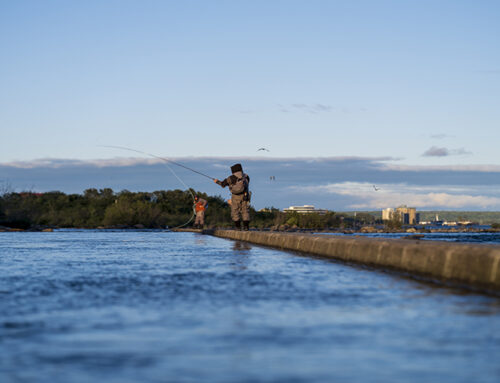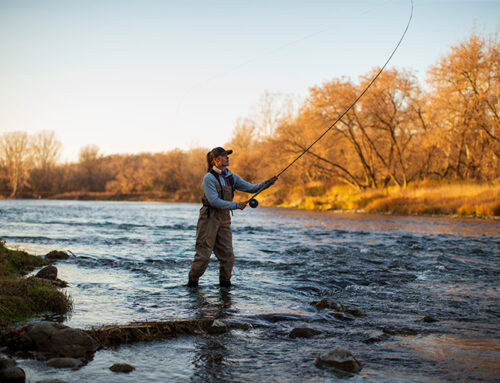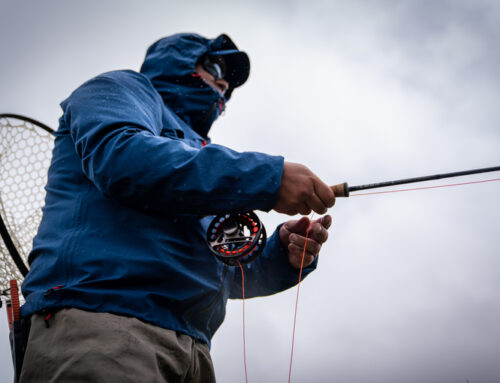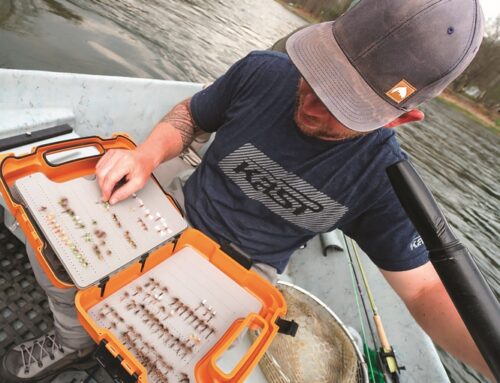There must have been a time when fishing wasn’t an ingrained part of my being, probably some time between birth and the drive home from the hospital with my parents. Fish, and the waters they keep, are part of my cognition. I know this will not change any time soon.
Getting Started
My passion for fly fishing came naturally. That is, it simply evolved from my youth spent not only chasing fish, but trying to unlock the secrets of rivers filled with all the creatures overturned rocks and minnow nets would reveal.
If you have never fished or haven’t been serious about it but would like to learn, you have a couple of options. The first is to buy a spinning outfit, a few lures, and a box of worms, and head to the water. Odd advice maybe, but if you log some hours with a spinning rod catching some fish and learning about types of water, structure, and fish movements, you’ll have a solid background before you pick up that first, more challenging, fly rod.
The other way to go is to simply jump into fly fishing feet first. There’s no wrong choice; you just need to feel your way.
Whichever approach you choose, remember that it’s a learning process and will take time. Don’t start by trying a complicated manoeuvre, such as fishing a size 18 dry fly to rising trout on a tree-lined stream, as you’re likely to get frustrated and discouraged.
Like any learner, you’ll need gratification as you gain experience. Head to a trout pond where open spaces and willing fish offer both. Or, try panfishing off an open dock or shoreline for a fun and easy introduction. As a kid, I always enjoyed the spring sucker run. It’s hard to beat river smallmouth for learning how to wade, read a river, cast over currents, and fight great fish.
Shorten the Learning Curve
You can learn on your own, but having a patient friend or mentor by your side is invaluable. If those are in short supply, there are numerous fly-fishing clubs around the province where you can meet like-minded people and get instruction.
You also owe it to yourself to hire a quality guide for at least a few outings. You can learn more in a couple of trips with an expert than in a few seasons on your own. Good guides will teach you more than how to catch fish; they will show you how to adapt to conditions such as temperature, water levels and turbidity, and changes in seasons, things that aren’t easily mastered through books or computer screens.
If you’re really keen to learn from the best, seek out a certified casting instructor. When people think of the art, beauty, and grace of fly fishing, they’re usually visualizing the cast. It could be argued that little is more important than learning to put your offering where it needs to go. Having a second set of eyes to watch and correct your casting faults is invaluable. And don’t think this process ever stops. The top golfers have swing coaches, and every seasoned fly caster can use refinement (whether they believe it or not). A word of advice: casting is almost all technique and timing and has very little to do with power. Great casters make it look effortless, because, to an extent, it is.
Getting Outfitted
Having a well-balanced outfit (rod, reel, and line) is one of the most important gear requirements. If any one of these is out of sync — too light, heavy, or powerful — you limit your success and enjoyment on the water. Getting outfitted with all you need to get started, from line to waders, doesn’t need to be exorbitantly expensive. Many brands have entry-level offerings that are superior to the high-end models of just a few years ago because of rapid product advancements. Seek advice from staff at a quality fly shop, and be prepared to answer their questions about the type of fishing you want to do and your estimated budget. You can probably save money buying used gear online, but beware of purchasing other people’s problems and mismatched gear that won’t suit your needs.
The Concept of Sport
Fly fishing is a sport — not like hockey or soccer — but a field sport built on tradition and conservation. And with it come regulations and guidelines (some more flexible than others), and angling etiquette with respect to the fish, the environment, and other anglers. The sporting tradition governs everything from properly fishing a dry fly upstream to a rising trout, to rotating through a salmon pool, to what constitutes fly fishing. A fly on the end of your line does not necessarily mean you’re fly fishing.
Anyway, the lore of the sport defines it and fills us with reverence. The history and philosophy of fly fishing are just as important as the physical aspects of casting and fly tying.
The Renaissance
Although fly fishing is steeped in tradition, it’s much more than its image of tweed jackets and ascots. The modern fly angler is savvy, in terms of electronics, gear, technical clothing, fly design, fishing techniques, and the global fish species that are chased.
Although still the domain of middle-aged white males, things are changing. Riverbanks have become more ethnically diverse and women are continually being drawn to the sport. You are much more likely to bump into a teenage fly angler rocking tunes out of his smart phone earpiece while tweeting out the latest catch than someone puffing on a pipe.
A State of Mind
Of all the attributes a successful fly angler needs, I believe confidence is the most important. Once you have decided to fly fish, do it — and it alone. Resist the temptation to bring a spinning rod as a “backup.” When times get tough, you will be tempted to resort to what you are most confident in, leaving the fly rod in the car or on the bank. It’s at precisely these times that you need to push on through, fly rod in hand. Out of experience, confidence is born and fortified, becoming self-fulfilling.
Above all, have fun.
Don’t get me wrong, I fish to catch fish. But fly fishing is as much an attitude as it is a physical action, and the complete experience is more important than any catch.
There’s an unfathomable amount of instructional information at your fingertips, from social media to online forums, blogs, and videos. This is both a blessing and a curse. The learning curve can be steep, but information overload is problematic. Focus on the basics of casting and reading water, and grow from there. Keep it simple.
The Never Ending Journey
To me, the present challenge facing fly anglers is how to incorporate modern ideas and technology into the sport to advance fly fishing, yet still remain true it. The online global exchange of ideas coupled with recent technological advancements in everything from rod resins, to breathable waders, to synthetic fly-tying materials has made these exciting times to be a fly angler, and I’m glad I’m along for the ride — the one that started in a car seat on the journey home so many years ago — and you should be too.








Leave A Comment